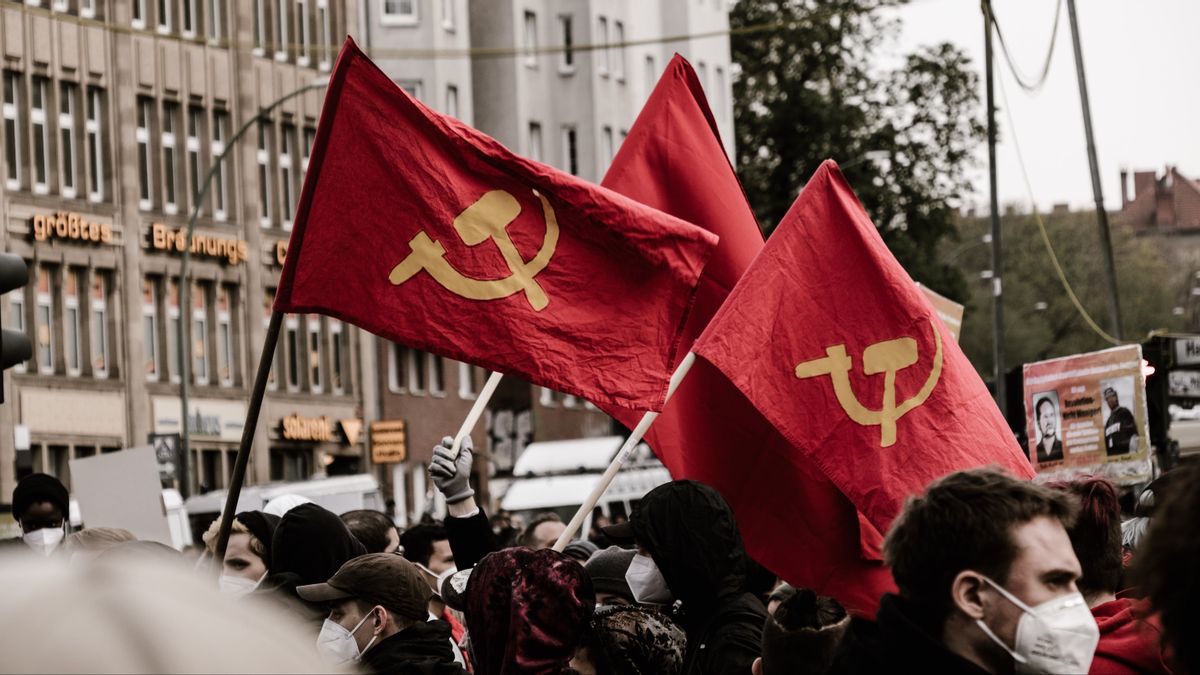JAKARTA - Communism is an ideology in political science and economics that emerged and developed around the 1840s. Drawn into the concept of the state, communism is the notion of a classless state. This article will discuss communism: concepts, examples, and all the controversies surrounding this ideology. How is communism in Indonesia?
Edi Rujirtawi, in the journal Communist: History of Social Movements and the Ideology of Power, explains that the word 'communism' appeared in France in the 1830s, along with the emergence of the word 'socialism'. Initially communism and socialism had the same meaning. But then the word 'communism' developed to refer to a more radical socialist school.
The socialist school demands the total abolition of private property rights and equal consumption. This sect also emphasizes on the independent struggle of the poor rather than expecting goodness from the government side. In English, communism is called 'communism'. Quoting the Encyclopedia Brittannica, 'communism' is explained as a political and economic doctrine.
The doctrine aims to replace private ownership with public ownership in a system of communal control, which includes at least the main means of production and use of natural resources. The characteristics of communism are described in the book Teaching Pancasila and Citizenship Education (Guidelines for College Lectures) by Zulfikar Putra and H. Farid Wajdi.
What are the characteristics of communism?First, communism teaches the theory of class struggle. In this case, the adherents of communism have high solidity in fighting for the fate of their class or group.
For example the proletariat against evictions, violations of workers' rights, and so on. Another characteristic of communism, its adherents are usually atheists.
The communists do not know the concept of faith in God and think that God does not exist. A feature that is also known in communism is the concept of communal or general ownership of goods.
One of their struggles is to eliminate ownership or power in the name of a particular individual or group. The last characteristic of communism is how they see the interests of groups -- whether in the form of groups or the society of a country as a whole -- as the main value that must be maintained.
Communist figures and their thoughts
1. Karl Marx
In 1867, Marx's scientific work, Das Kapital, volume one was published. Karl Marx later died in 1883, halfway through the completion of the second volume. Marx's scientific work was then continued by Friederich Engels based on notes and manuscripts left by Marx.
This scientific work later became the basis for the theory of modern communism. According to data from the website of Universitas Gadjah Mada (UGM), about a century after Marx's death, the number of people who were influenced by Marxism had almost reached 1.3 billion. And it's not an empty number.
Marx's modern theory of communism has deep roots as an ideology. Most adherents of Marxism have taken into account the long-term importance of communism, Marxism has ascertained its influence in world life for many centuries to come.
This number of 1.3 billion adherents of Marxism is greater than the number of adherents of any other ideology in human history. The concept of communism, they believe will win in the future. Even so, this deeply ingrained belief is somewhat sanctioned.
Moreover, looking at the other side, where constitutional democracy also shows extraordinary developments. Constitutional democracy is considered by many to be more rational as the current that will be embraced by many human beings in the future.
The spotlight of doubt also concerns the big questions about Marx's role in the communist movement.
2. Joseph Stalin
Joseph Stalin is known as the dictator of the Soviet Union. He ruled for 24 years, from 1929 to 1953. Stalin was born in Russia on December 18, 1879. Stalin's 'communist-communist' attitude has been shown since childhood, about how he rebelled and opposed his mother's decision to become a religious figure.
Citing the BBC, Stalin was inspired by Karl Marx. Stain often read Marx's notes. Stalin was also active in the socialist group that grew up around him. Most of Stalin's time was allocated to revolt against the Russian monarchy. With all these movements, Stalin's school was abandoned.
Stalin's communist attitude grew stronger. He who declared himself atheist argued a lot with the clergy, until Stalin was expelled from religious school in 1899. At that time Stalin failed to pass the exam. One of Stalin's best-known attitudes and thoughts is Stalinism.
He implemented this as a policy during his time as dictator. Stalin had big dreams of building a socialism and communist society in the Soviet Union. Not grandiose. At that time the Communist Party of the Soviet Union was highly regarded as the guardian of the communist revolution.
3. Fidel Castro
Fidel Castro was the President of Cuba who served from 1976 to 2008. Castro was born on August 13, 1926 in Holguin, Cuba. Castro was known to be communist.
That understanding grew since he studied law at the University of Havana. Castro took part in the fight against the Colombian government and the right-wing Dominican Republic.
Castro is known to be influenced by the two figures above. In the book History of the Rebellion El Comandante Fidel Castro explains how Castro implemented the Marxist-Leninist Program in Cuba.
The policy began on December 2, 1961. Castro is also known as the founder of the Cuban Communist Party. At the end of 1961, Castro declared himself a true communist. The image that was maintained until the end of his life on November 25, 2016 when he was 90 years old.
Communism in Indonesia"The permanent" aka "Continuous revolution" or evolving continuously. The communist revolution spread to all parts of the world. In Indonesia, the state is now 'forbidding' communist ideology. The rebellion of the Indonesian Communist Party on September 30, 1965 (G30S/PKI) underlies this prohibition. However, communism itself entered Indonesia long before the PKI was founded.
He was a Dutch citizen named Hendricus Josephus Fransiscus Marie Sneevliet, a figure who is believed to have brought communism to Indonesia in 1913. Sneevliet, together with his colleague, Adolf Baars, founded the Indische Sociaal Democratische Vereeniging (ISDV). At the beginning of its emergence ISDV did not directly propagate communists.
But their movement changed course. In 1917, the PKI was established as a leftist faction within the Sarekat Islam (SI). Semaun and Darsono, two important PKI figures, had received education on Sneevlit-style communism at the Indische Social Demoratische Partij (ISDP). Indeed, since the success of the revolution in Russia, the influence of communism has spread globally.

They belong to organizations and community groups. The entry of communist ideology into the SI itself occurred because of a gap in the struggle that the SI could not accommodate. "The Sarekat Islam which does not pay attention to the fate of workers has become a good vacancy for the radical ideas submitted by Semaun and Darsono," Mohammad Hatta in the book Bung Hatta Answers.
The name of the PKI began to grow when SI leader Haji Agus Salam changed the name of SI to the Syarikat Islam Party in 1921. Their silent movement began to be heard. The PKI's political power also grew. A number of rebellions were carried out by the PKI: 1926, 1948, and 1965. The first rebellions were carried out during the Dutch colonial period. The PKI failed.
Thousands of people were killed. About 13,000 others were detained. Meanwhile, 1,308 people, dominated by PKI cadres, were sent to Boven Digul, a detention camp in Papua. In the second rebellion, the PKI at that time faced the Republic of Indonesia, which they wanted to turn into a communist state. Failed again. In the third uprising, the PKI again failed. The rebellion had long implications for how this country viewed communist ideology.
*Read other information about HISTORY or read other interesting writings from Yudhistira Mahabharata.
Other BERNASThe English, Chinese, Japanese, Arabic, and French versions are automatically generated by the AI. So there may still be inaccuracies in translating, please always see Indonesian as our main language. (system supported by DigitalSiber.id)











